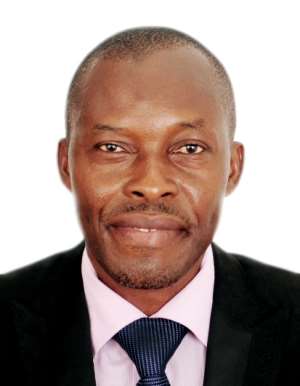
In the 21st century, the increasing human pressure and growing need to balance competing demands are the ideas of currency. The contribution of a knowledge worker leaves a good deal to be desired in building capacity of organizations by using the transforming power of science and technology for wealth creation. The journey of the knowledge worker has always been systematic with an attempt to obtain answers to meaningful questions about phenomenon or events through the application of scientific procedures. Unescapably, these efforts have produced quality result on our life-supporting systems: marketable technologies from Animal research institutes, Building and Road Research institutes, Crops research institutes, and Forestry research institutes, outputs from Food research Institutes, Industrial research institutes, Oil Palm Research Institutes, Plant Genetic Resources research institutes, amid contribution from Savana Agricultural Research Institute, Soil Research Institute, Science and Technology Policy Research institutes and Water Research Institute are few examples.
Baidoo and Afful (2018) emphasized that the continuing search for resources has led to discovery of new resources and better ways of using older ones. It also provided nugget of information on the state of the environment and use of natural resources. Thomas Malthus (1798) cautioned that as human population tends to increase more rapidly than food supplies, human population will be unable to sustain itself in the future. Many researchers and scientists also predicted that by 2050, increased human consumption and activity will deplete the natural resources. This is what William Rees refers to as the effect of ecological footprint. The pressure on land, soli, forest, water, animals, biodiversity and all supporting system are the cost that confronts our communities, nations and the world for which knowledge worker must be encouraged to provide cutting edge innovation solutions.
The current trend, opportunities and emerging situations is a backdrop to equip ourselves with the scientific knowledge and probably convert them into action in order to accelerate the socio-economic development of the nation. From the political lens, Robert Green (2000) stated that everyone understands the need for a change in the abstract, but on our day to day level people are creatures of habits. This notwithstanding, the consequential theory states that a behavior is good if the result is in the greatest ratio of good to evil for everyone. According to Drucker (2006) unless the executive or the knowledge worker makes special efforts to get access to outside reality, he will become increasingly inside focused. It is by getting the right information from your customers or clients through effective research that knowledge can be converted into action. Rob Yeung (2007) advocated that you research your customer because customer research will never guide you infallibly to an answer. Much as success creates new opportunity so do failures as acclaimed by Drucker.
Every organization needs to leave footprints in three areas in order to be effective. The first emphasis by Drucker is on direct result of the contribution of every knowledge worker who is supposed to produce ideas, information, and concept to guide an organization. The commercialization of the technology products must meet the needs of society and consequently create wealth for the society. One of such sustainable knowledge-based projects of our modern day society that permeates the needs of the society is the snail and bee projects undertaken by Prof Paul P. Bosu of the Council for Scientific and Industrial Research, Ghana.
For the knowledge worker to succeed there must be a concerted effort to building values that allows an executive achieve result. Without this value, organization degenerates into disorganization. These values guide the individual and become the basis for assessment. As said by Drucker, organizations need commitment to values as the body needs vitamins and minerals.
Finally, there is the need to build and develop people for tomorrow. An organization that is focused on contribution must also mentor and prepare managers for tomorrow in order to sustain the gains of an institution
As we diagnose the current situation of the research worker, stakeholders must focus on what needs to be done to help the knowledge worker, society and industries while developing an action plan with responsibility for decisions and communication while focusing on the opportunities through productive decisions.




 Akufo-Addo commissions Phase II of Kaleo solar power plant
Akufo-Addo commissions Phase II of Kaleo solar power plant
 NDC panics over Bawumia’s visit to Pope Francis
NDC panics over Bawumia’s visit to Pope Francis
 EC blasts Mahama over “false” claims on recruitment of Returning Officers
EC blasts Mahama over “false” claims on recruitment of Returning Officers
 Lands Minister gives ultimatum to Future Global Resources to revamp Prestea/Bogo...
Lands Minister gives ultimatum to Future Global Resources to revamp Prestea/Bogo...
 Wa Naa appeals to Akufo-Addo to audit state lands in Wa
Wa Naa appeals to Akufo-Addo to audit state lands in Wa
 Prof Opoku-Agyemang misunderstood Bawumia’s ‘driver mate’ analogy – Miracles Abo...
Prof Opoku-Agyemang misunderstood Bawumia’s ‘driver mate’ analogy – Miracles Abo...
 EU confident Ghana will not sign Anti-LGBTQI Bill
EU confident Ghana will not sign Anti-LGBTQI Bill
 Suspend implementation of Planting for Food and Jobs for 2024 - Stakeholders
Suspend implementation of Planting for Food and Jobs for 2024 - Stakeholders
 Tema West Municipal Assembly gets Ghana's First Female Aircraft Marshaller as ne...
Tema West Municipal Assembly gets Ghana's First Female Aircraft Marshaller as ne...
 Dumsor is affecting us double, release timetable – Disability Federation to ECG
Dumsor is affecting us double, release timetable – Disability Federation to ECG
